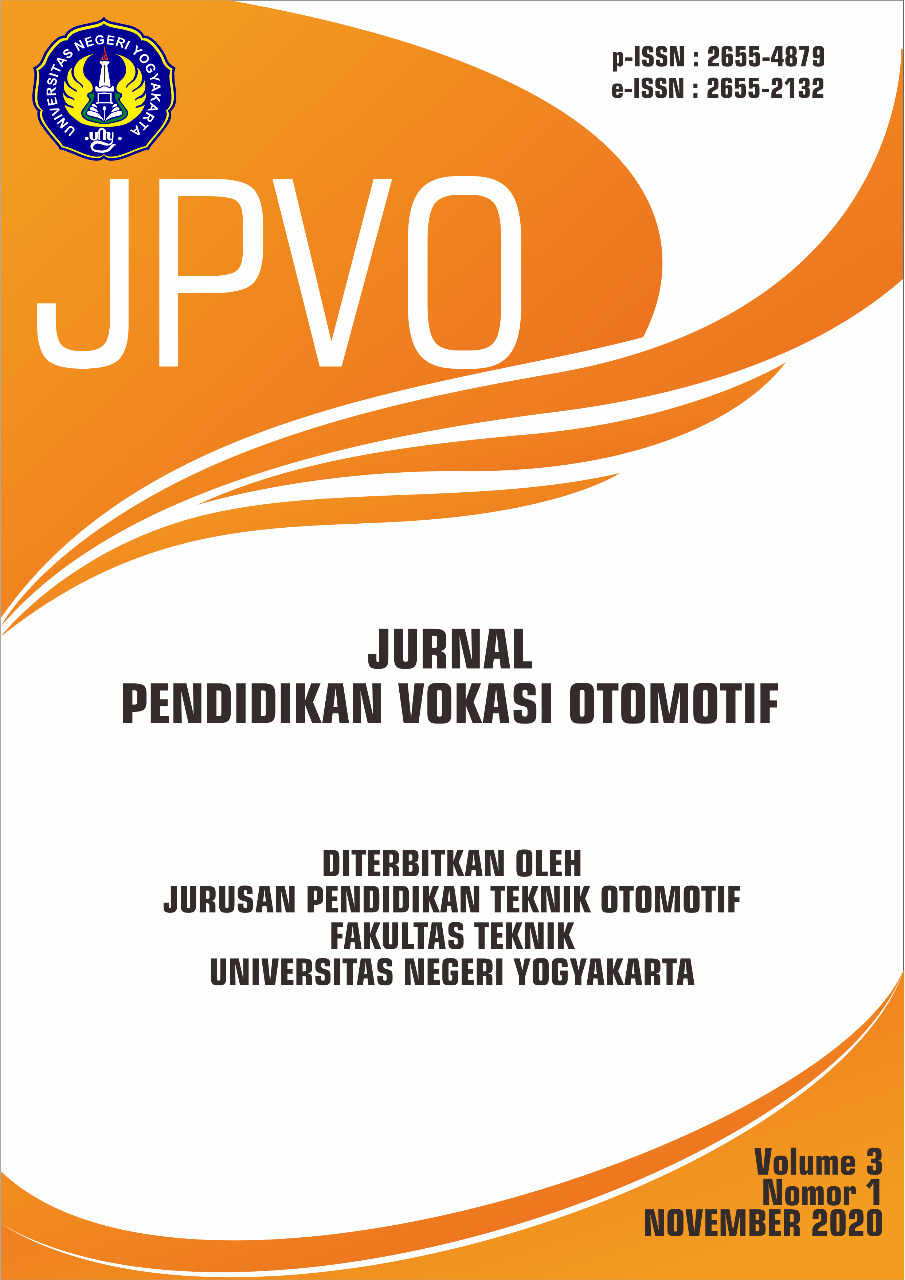AKULTURASI KOMPETENSI BIDANG CHASIS KENDARAAN PADA KURIKULUM BERBASIS KERJASAMA INDUSTRI
DOI:
https://doi.org/10.21831/jpvo.v6i1.67749Keywords:
Acculturation, Chassis CompetenceAbstract
Abstract
The potential for human resource development in Chassis' area of expertise is still very broad. In addition, the time span of its usefulness is still very long because it is not displaced by the transition of electric vehicles. Therefore, it is important to conduct research that develops the competence of the Chassis area of expertise, which then cultures it into the curriculum and learning of automotive workshops and partner industries. This type of research is qualitative descriptive research. Data were collected through surveys, interviews, FGDs and observations in the automotive industry regarding wheel alignment competencies. The results showed that attitudes that can be observed and experienced developments when carrying out jobs in campus workshops and the chassis industry include accuracy in measuring chassis components, dexterity in carrying out the sequence of work and responsibility in working on vehicle maintenance and repair needs. In the aspect of automotive technology knowledge, components that can be observed for development includebasic knowledge, working principles, procedures, understanding of construction, knowledge of vehicle safety and security equipment requirements. Meanwhile, the ability to diagnose tire/wheel problems/damage skills according to manual repair procedures and skills in carrying out vehicle chassis maintenance procedures.
.
References
Abdurrahman, Parmin, Muryanto S. (2022). Evaluation on the automotive skill competency test through "˜discontinuity' model and the competency test management of vocational education school in Central Java, Indonesia. Heliyon. 8(2):e08872. Available from: https://doi.org/10.1016/j.heliyon.2022.e08872
Alvesson, M. & Sveningsson, S. (2016). Changing Organizational Culture.
Anugerah, O, Papuling, P, Sugiarto, A, Kristen, U, Wacana, S. (2021). Membangun Manajemen Keberagaman Melalui Akulturasi Budaya Kerja Karyawan Ekspatriat dan Karyawan Lokal. Jurnal Ilmu Sos dan Hum. 21;10 (3).
Berry, J.W. (2005). Acculturation: Living successfully in two cultures. Int. J. Intercult Relations. 29 (6 SPEC. ISS.):697–712.
Bol, T. & Van De Werfhorst, H.G. (2011). Signals and closure by degrees: The education effect across 15 European countries. Res Soc Stratif Mobil [Internet]. 29(1):119–32. Available from: http://dx.doi.org/10.1016/j.rssm.2010.12.002.
International Atomic Energy Agency. (2016). The Competency Framework : A guide for IAEA managers and staff. A guide for IAEA managers and staff. Available from: https://www.iaea.org/sites/default/files/18/03/competency-framework.pdf
Kementerian Perindustrian. (2016). Menengok Nilai dan Budaya Kerja Kementerian Perindustrian. Solusi Vol. 6.
Koudahl. (2010). Vocational education and training: Dual education and economic crises. Procedia - Soc Behav Sci [Internet]. 2010;9:1900–5. Available from: http://dx.doi.org/ 10.1016/j.sbspro.12.421.
Muja, A., Blommaert, L., Gesthuizen, M., Wolbers, MHJ,. (2019). The vocational impact of educational programs on youth labor market integration. Res Soc Stratif Mobil [Internet]. 64: 100437. Available from: https://doi.org/10.1016/ j.rssm. 100437.
Overtoom, C. (2000). Employability Skills : An Update . ERIC Digest. ERIC Dig No 220. 2000;(220):1–8. Available from: https://eric.ed.gov/?id=ED445236.
Parry, SB. (1996). The Quest for Competencies. Training. 33(7):48–54.
Pavlova, M. (2009). Technical and Vocational Education and Training: Issues, Concerns and Prospects. 1-208. Technology and Vocational Education UNESCO-UNEVOC Book Series.
Robinson, J. (2000). What are employability skills. 1(3):1–3. Available from: http://www. fremont.k12.ca.us/cms/lib04/CA01000848/Centricity/Domain/189/employability-skills.pdf.
Thompson, JF. (1973). Found a tions of vocational education. New Jersey: PRENTICE-HALL, INC.
Vos A De, Hauw S De, Willemse I. (2011). Competency Development in Organizations: Building an Integrative Model Through a Qualitative Study. Vlerick Leuven Gent. 1–38.
Wong, S.C. (2020). Competency Definitions, Development and Assessment: A Brief Review. Int. J. Acad Res Progress Educ Dev. 9(3).
.
Downloads
Published
How to Cite
Issue
Section
Citation Check
License
Jurnal Pendidikan Vokasi Otomotif allows readers to read, download, copy, distribute, print, search, or link to the full texts of its articles and allow readers to use them for any other lawful purpose. The journal allows the author(s) to hold the copyright without restrictions. Finally, the journal allows the author(s) to retain publishing rights without restrictions

Jurnal Pendidikan Vokasi Otomotif is licensed under a Creative Commons Attribution-ShareAlike 4.0 International License.
Based on a work at https://journal.uny.ac.id/index.php/jpvo.









